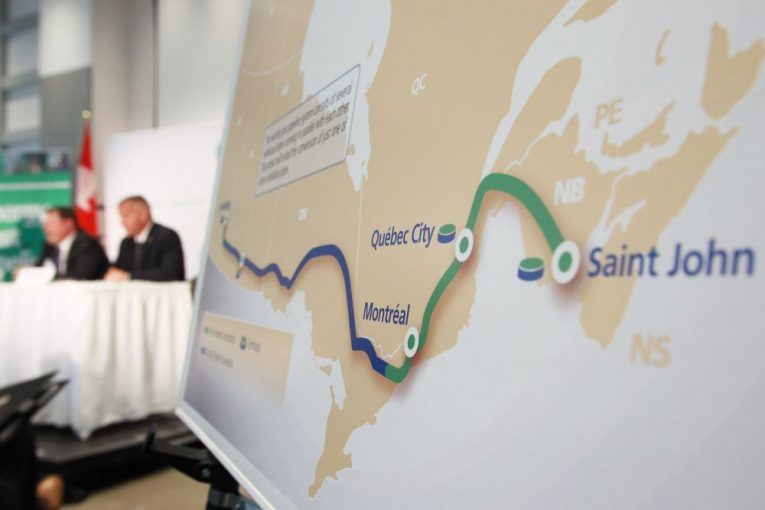
The situation unfolding around TransCanada Corp.’s Energy East pipeline project is the result of a rookie National Energy Board panel gone rogue.
It could be said this is what happens when governments try too hard to please a vocal minority.
The new three-member Energy East review panel was named in January, after the original appointees resigned over conflict-of-interest criticisms that surfaced after it was learned two members had met privately with former Quebec premier Jean Charest, who TransCanada had contracted for consulting work.
The new panel members, each accomplished in their own right, don’t exactly inspire confidence when it comes to the role they’ve been given. Nor do their qualifications mean they’re equipped to carry out the NEB’s mandate.
The first clue was their decision to include upstream greenhouse-gas emissions in their review of Energy East. This is outside the purview of the NEB — and is one of the primary reasons why TransCanada asked for the review of Energy East to be paused for 30 days while it assesses the impact of the panel’s direction.
The NEB is what lawyers call a creature of statute. Its mandate is regulating the construction, operation and decommissioning and abandonment of pipelines. It does not include the development and production of oil and natural gas within specific provinces. The regulation of oil and gas development, as per the Constitution, falls under provincial jurisdiction.
A submission to the NEB in June from TransCanada’s outside legal counsel reads: “It would be contrary to the division of powers for a federally constituted board to consider upstream and downstream GHG emissions in circumstances where such consideration impacted the provincially controlled extraction and production of oil and gas (including, for example, the extraction and production of oil from the oilsands within the province of Alberta) and where it effectively amounted to regulation of such extraction and production.”
That is but one of the legacies of former premier Peter Lougheed.
The rookie panel also appears to have ignored the body of case law involving other pipeline projects that were challenged but ultimately approved.
TransCanada’s request to suspend the Energy East review stems from the fledgling panel’s decision to include upstream emissions associated with the project, despite a memorandum of understanding between the NEB chair and Environment and Climate Change Canada stating the latter agency would undertake the review of upstream GHG emissions for Energy East. In other words, the federal government would assess upstream GHG emissions, not the NEB.
That’s just the beginning.
Upstream emissions were not considered in the review of Enbridge’s Line 9 reversal.
Here is what the NEB clearly stated in that case: “Discussion or consideration of alternatives to fossil fuels, or to the development of the oilsands bear on broader policy question that are beyond the jurisdiction of the board and separate from the proposed project.”
A similar tone was struck by the joint review panel appointed to review the Northern Gateway project: “Participants also requested the panel consider broader policy issues related to the oilsands such as the appropriateness of further development of the oilsands or Canada’s overall energy policy,” it said. “Consideration of these larger policy issues are beyond the scope of the environmental assessment as set out in the panel’s terms of reference. We are also of the view that these policy issues are also beyond the scope of our regulatory mandate in relation to interprovincial and international pipelines under the NEB Act.”
There is also an apparent lack of understanding about what the Alberta government has done with respect to the management of emissions from oilsands extraction through its enactment of the Oil Sands Emissions Limit Act.
Again, as TransCanada’s lawyers stated, the panel appears not to understand its jurisdictional boundaries.
“It is also beyond the jurisdictional mandate of the board to second-guess the Alberta legislature and impose its own separate and distinct conditions and restrictions on upstream oil and gas development in Alberta. The board has no authority to mandate or direct the implementation of (the Oil Sands Emissions Limit Act), or to ignore its implementation. Any attempt by the board to do so would be a recipe for disaster.”
Prior NEB panels recognized theirs is not where government policy is either debated or set — it is where policy is implemented.
Therefore, when all the threads are pulled together, this issue is bigger than TransCanada. It is about the National Energy Board and its reputation as a fair and mindful regulator, which implements government policy but does not set it.
Despite what some have been led to believe through cheap political statements, the NEB is highly regarded around the globe. But this latest review stands to destroy that — and take with it not just TransCanada’s project, but reputation of this country as a place to invest.
The process has also raised questions about why three individuals with no prior NEB experience were appointed to handle such a contentious file in the first place.
It behooves the federal government — more specifically, federal Natural Resources Minister Jim Carr — to dissolve the panel appointed to review Energy East and replace it with individuals who have the ability, requisite knowledge and respect for Constitutional authority to carry out this important task.
Yes, it will mean a further delay but to leave it in place sets a dangerous precedent, not to mention has the very real potential to compromise Canada’s economic future. That’s not a consequence that should be risked.
Deborah Yedlin is a Calgary Herald columnist
You can read more of the news on source
